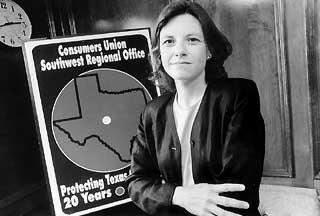Naked City
Electric Shock
By Dan Oko, Fri., June 2, 2000

There's a saying in politics that, once you've spent a few million dollars here and a few million there, you might end up talking about real money.
Change those millions to billions, and you could be talking about the outlook for utility deregulation, a complex and sometimes yawn-inducing topic that will affect every household and business in Texas by the time many of the state's largest utilities are freed from government price-setting and regulation. Critics worry that changes stemming from last year's successful electric utility deregulation bill (Senate Bill 7) could leave Texans with little choice but to pay the billions of dollars electric utilities say they will need to implement the law they supported.
Currently, investor-owned utilities, such as TXU Electric and Reliant, are working with the Texas Public Utilities Commission to figure out exactly how the deregulated system will work. For now, rates have been frozen at the level they were last fall, and will be reduced another 6% in 2002. The law also gives electric cooperatives, such as the Pedernales Electric Co-op, and municipally owned power companies, such as Austin Energy, the choice of whether to join the competition.
State commissioners are not expected to establish rules for deregulation before next year, but PUC spokesman Terry Hadley acknowledges that estimates for so-called stranded costs -- which include old debt and plant value that will be lost because of competition -- are far higher than figures offered during last year's debate over the legislation, when PUC estimated that stranded costs might run $4.3 billion. (Industry estimates, meanwhile, ran as high as $9 billion.) Some sources now place the amount of stranded costs at over $12 billion, a sum that some skeptics say could stymie the competition deregulation was supposed to foster.
A spokesman for Dallas-based TXU Electric, formerly Texas Utilities, acknowledges that his company came in nearly $700 million above its highest original estimate, but says that the company was just amending its numbers according to PUC recommendations.
Consumer advocates say they're concerned that as these costs get passed along to consumers, residential ratepayers will have to pay the lion's share, while commercial and industrial ratepayers lobby the utility commission to avoid paying what they owe. Some opposed to deregulation also argue that fewer utilities will be able to afford to enter the retail market if newcomers are forced to help pay billions in stranded costs as the law says they must.
Consumers Union policy expert Janee Briesemeister maintains that if the PUC approves stranded costs at the levels that are currently being quoted, smaller companies will be locked out of Texas' electric utility market altogether. The amount of money new retailers will be forced to pay to help generators make up the billions that the big companies are asking for could be prohibitive, she says. "There's a point at which competitors might say they can't make a profit given the level of stranded costs, which means there won't be a competitive choice for residential customers," says Briesemeister.
Chris Schein, a spokesman for TXU Electric, says that such "allegations" are yet to be proven. "The average Joe doesn't have any idea how deregulation is going to happen," he says. "What we do know is that our current rates are going to go down in 2002, and that we will throw our doors open so we can compete for your business. We believe there will always be room for nimble competitors."
The PUC's Hadley reiterates that the estimated stranded costs are just a starting point in the bargaining process. He points out that the legislation already has provisions to protect consumers, and that the commission itself has no choice but to uphold the law as it determines the best way to complete the process of deregulating Texas' utilities. After two years of deregulation in 2004, he adds, the PUC will be able to review electric rates and fine-tune the system if necessary.
"The intent of the law is to provide a competitive climate, but also to provide utilities with a way to guarantee their concerns," Hadley says. "The key to all this is what the final numbers will be, and what consumers are going to be willing to pay."
Such logic doesn't sit well with Public Citizen state director Tom "Smitty" Smith, another vocal critic of deregulation. "During the debate," he says, "we questioned whether the utilities might try to do something like this. They've had the potential all along to say that they got the numbers wrong, and to use that to stifle competition."
For Austinites who get their power from Austin Energy, which isn't required to join in the competitive market, the emerging scenario may not be particularly dire. Ed Clark, AE's director of communications, says that municipal and cooperative power retailers can adopt a wait-and-see posture while the PUC hammers out the rules and fees associated with deregulation. He says that Austin Energy and the city government can gain a clear idea of whether the utility is ready to become competitive before stepping onto the playing field. "Stranded costs are just one component of deregulation," says Clark. "Does it hurt us opting in or not opting in? That may be the real question."
Got something to say on the subject? Send a letter to the editor.








